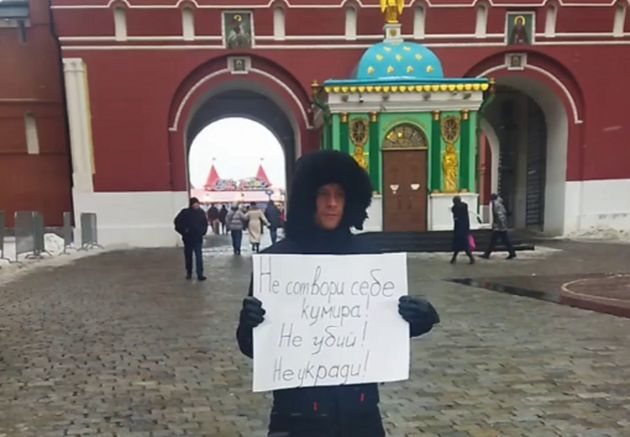Several people were fined for quoting "Thou shalt not kill" publicly. Parliament passed a draft law to punish the spreading of “false information” about Russian army.
![Moscow, Russia. / Photo: [link]Felipe Simo[/link], Unsplash CC0.](https://cms.evangelicalfocus.com/upload/imagenes/641b4e703391b_felipesimo.jpg) Moscow, Russia. / Photo: [link]Felipe Simo[/link], Unsplash CC0.
Moscow, Russia. / Photo: [link]Felipe Simo[/link], Unsplash CC0.
Since the Russian invasion of Ukraine, Russians who express their opposition to it on grounds of faith or with the use of religious materials, continue to be detained and fined under Russia's wartime laws punishing "discrediting the Armed Forces".
One of them was Rostislav Charushin. Police arrested him in Moscow because a poster he had that quoted three of the Bible's Ten Commandments, including Thou shalt not kill, “clearly expresses a negative attitude towards the use of the Armed Forces to protect the interests of the Russian Federation and its citizens”.
He was fined him twice on 9 March for both “discreditation” and violation of the Demonstrations Law. The judge also ordered to destroy to the poster.
Furthermore, musician Anna Chagina was accused of repeatedly “discrediting” the Russian Armed Forces, by displaying a poster reading "Blessed are the peacemakers” at a protest, and by posting anti-war materials on the VKontakte social media site.
“Many times after [the arrest], I inwardly turned to these words of Christ and realised that peacemaking begins with what is in a person's heart”, Chagina told Forum 18.
Chagina has been under a court-ordered night-time curfew and a ban on using the internet, and is fitted with an ankle bracelet to monitor her movements.
In his first trial on 15 March, the court extended the restrictions until 2 September. Her next hearing will take place on 11 April.
If convicted, she could spend up to three years in prison or have to pay a fine of up to 300,000 Roubles (3,6017€ ).
Police in the Far Eastern city of Vladivostok detained a local resident on 8 February for a poster also quoting the Bible's sixth commandment. He was detained on two mote occasions for similar protests, but it does not yet appear to have been prosecuted.

This month the Russian parliament passed a draft law which will increase maximum punishments for “repeatedly discrediting” the Russian armed forces and for "spreading false information” about them. It was then sent to be signed into law by President Vladimir Putin.
The draft law also applies “to criticism of volunteer formations, organisations and individuals who assist in the fulfilment of tasks assigned to the Armed Forces of the Russian Federation”.
“Today, every soldier and officer, regardless of whether he is in the Armed Forces or the volunteers, must understand: lies and slander against him will be punished, and they are protected by law”, Duma speaker Vyacheslav Volodin said in parliament.
According to Forum 18, as of 23 February 2023, there have been a total of 447 criminal prosecutions for anti-war activities. Police and other investigative agencies also use other Criminal Code Articles against people protesting against the war but are not yet known to have done so to punish anyone protesting from a religious perspective.
The Federal Service for Supervision of Communications, Information Technology and Mass Media (Roskomnadzor) has blocked access to over 10,000 websites, both Russian and foreign since Russia's invasion of Ukraine.
The main reason is “military censorship”, according to a report of 8 February 2023 by digital rights organisation Roskomsvoboda, because the sites “have generally described events in Ukraine as a war, discussed Russian losses or alleged atrocities, or criticised the Russian government and armed forces”.
The websites include “foreign media outlets (such as Radio Free Europe, the BBC, Deutsche Welle); Russian independent media; human rights organisations (Human Rights Watch, Moscow Helsinki Group); the sites and blogs of individual activists; and social media such as Twitter and Facebook.
[donate]

Las opiniones vertidas por nuestros colaboradores se realizan a nivel personal, pudiendo coincidir o no con la postura de la dirección de Protestante Digital.
Si quieres comentar o